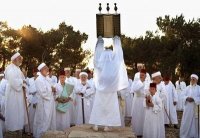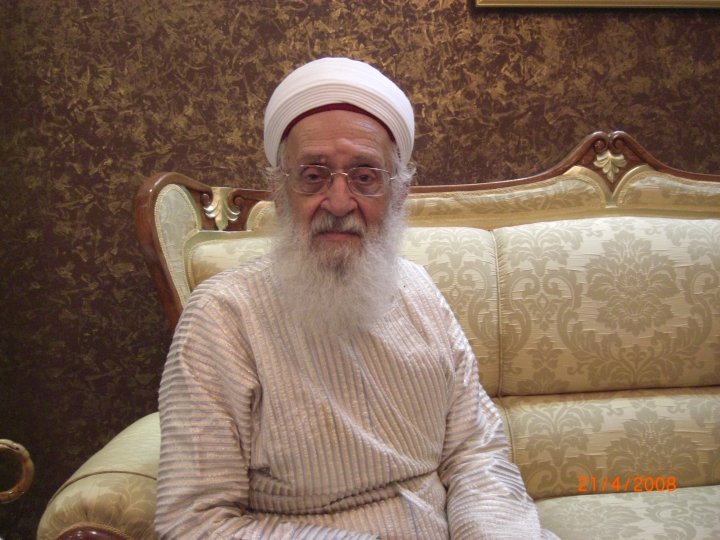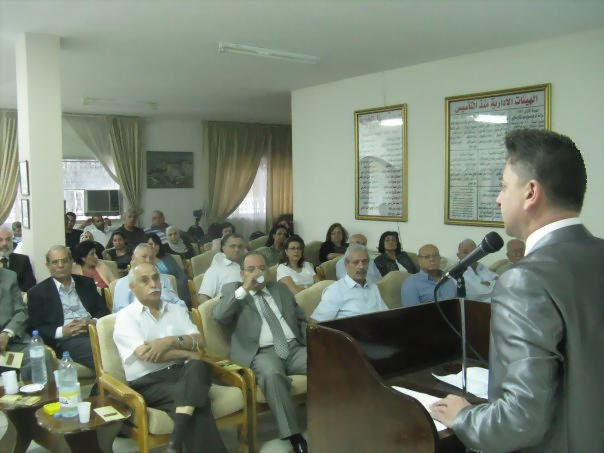
|
Jan/ Feb 2010 |
Vol. IX - No.3 |
|
|
In This Issue · Priest Elazar · Links · Editor · Turbulent · Legend · Chain · Misc. articles · Books for sale
The
Samaritan Update, is a Bi-Monthly Internet Newsletter -----
Editor: Shomron
Co-Editor: Osher
Sassoni
Staff Writer:
Staff Photographer:
Staff Translator:
Special Contributors: ----
Contact information:
The Samaritan Update is trying something new. Please give us your feedback! 
Choose a language to translate this page!
Subscribe To the Newsletter -The
Samaritan Update. Sign Up ! The Samaritans call themselves Bene-Yisrael (“Children of Israel”), or Shamerim (“Observant Ones”) Samaritan Studies and Related
Conferences: 2010 International Meeting
Meeting Begins:
7/25/2010 Call For Papers Opens:
10/1/2009
Keep Up with the Samaritan Basketball team on FANS of Samritan basketball team
Community Youth Club Samaritan on Facebook.com SAMARITAN MYTHسطورة السامريةהאגדה השומרונית الا
A group of young Samaritans people who is interested in their culture, heritage and the future of their small community, we establish an association which is called Samaritan myth. This association is aimed on the definition of Samaritan's culture and heritage the internal and external one. Can be found on Facebook.com and see Smaritan Blogspot Important Links
Samaritan Museum on Mount Gerizim. New Samaritans- A DOCUMENTARY on Samaritan brides from the Ukraine Have you
purchased your book lately? Notices Of The Modern Samaritans: Illustrated By Incidents In The Life Of Jacob Esh Shelaby (1855) by Jacob Esh Shelaby and Edward Thomas Rogers (Paperback - Mar 20, 2009) Forth Coming Books The English Translation of the Samaritan Pentateuch Update on the English Translation of the Samaritan Pentateuch from Logos Unknown publication date
The first-ever English translation of the Samaritan Pentateuch, prepared by Benyamin Tsedaka WILL be published by Logos. The book shall be published near the end of this year. We shall keep you informed when we learn more.
|
High Priest Elazar b. Tsedaka the 'Aabta'ey[1927-2010]
The
High Priest Elazar b. Tsedaka the 'Aabta'ey [1927-2010]
is no longer with us. On Feb. 3rd, at 8PM, he left us to the World of
Souls while we are shocked and sad as, we are still now. May his soul will
be BLESSED by the Almighty and he WILL dwell in paradise for good, Amen.
Thanks to the prayer of Moses for him, Amen Amen.
The High Priest Elazar was born in
Jan.16, 1927
after 83 years of a very interesting life when his people, the Israelite
Samaritans were close to extinction up to the present when they are
looking forward to prosperity and increasing in their numbers 5 times to
729 individuals as of January 1, 2010.
He was born in Nablus, Palestine, under the
British Mandate to his mother Munira and his father,
the leader Tsedaka b. High Priest Isaac b. High Priest 'Amram.
When he was 5 months old, the community had suffered an earthquake started
in Syria spreading to Safad,
Nablus,
Jerusalem
and Beer Sheba. It destroyed the tiny old
Samaritan Neighborhood and forced the community to move to the only
piece of land they had under heaven, the old and tiny Samaritan Cemetery.
There he was raised in a small tent between the graves for four months,
until they were rescued by an Arab leader from Nablus, Achmad el-Shaq'ah
who donated the
Samaritans a
peace of land on the western slopes of Gerizim Mountain. This location of
the new Samaritan neighborhood started to be populated in 1933 by his own
family, his father Tsedaka and his uncle
High Priest 'Amram B.
High Priest Isaac.
There in the new developed neighborhood Elazar had been raised by
his relatives, the priests to conclude his education by the reading of the
Pentateuch in
Ancient Hebrew and
studying in modern Arab schools, to be a brilliant student that became a
teacher of mathematics in high school. His father became the known leader
of the community before the Jordanian Authorities and close friend
of Kings 'Abdulla and his grandson
King Hussein of Jordan
who became the greatest supporters of the community, especially during
the years of May 1948 - June 1967 when the increased Samaritan community
was separated between the State of Israel and the Royal
Hashemite Kingdom of Jordan.
In 1974 the priest Elazar, then 47, dedicated himself to be a full
priest in the community and recognized as one of the most brilliant
writers and poets of the present, very distinguished and talkative on
behalf of his own people. He was involved in many self researches of the
Samaritan heritage. He has raised a family of his own, his wife Ruchama,
three sons and one daughter.
In June 1986 he was sent by the High Priest Jacob b. 'Azzi
[1899-1987] to meet Pope Jean Paul the Second in Rome to make
reconciliation between the Christian Church and the Samaritans. This
meeting gave way to make the foundation of the
Mount Gerizim
International Peace Center in Kiriat Luza, the
Samaritan Neighborhood on Gerizim Mountain. This neighborhood began in
1988 the new center of the Samaritans OF Nablus that moved there
completely till 1998
In July 1995 Priest Elazar was invited to be a member of the A.B. - Samaritan News delegation to Washington D.C. and London (two superpowers, USA and United Kingdom) to speak on behalf of the Samaritan People to ensure a political backing for them in any political situation between the State of Israel and the Palestinians.
In 1996 he was invited to attend the Fourth International Congress
of Samaritan Studies in Milan, Italy and four years later in 2000 at
the Fifth International Congress of Samaritan Studies in Helsinki,
Finland, He gave a lecture on Samaritan writers and commentators of the
Law in Arabic and was elected to be a member of the Society of
Samaritan Studies [SES] founded in Paris in October 1985. High
Priest Elazar always encouraged the research of Samaritan Studies.
In February 9, 2004 he became the 131st High Priest since Aaron, Moses'
brother after the death of his cousin the High Priest Shalom b. High
Priest 'Amram. During his role in office he has lead the Samaritan
religious and personal events in wisdom and dignity. Since the
establishment of the A.B. - The Samaritan News Bi-Weekly Magazine he
became a constant participant in the magazine in writing articles and
hundreds of new poems.
In 2008, he received the First Samaritan Medal of Peace and
Humanitarian Achievements in a special ceremony on
Mount Gerizim. The award was given to him by the Board's
Executive of the Samaritan Medal Foundation established in
Washington D.C. in Nov. 2005.
High Priest Elazar was a very welcomed guest in the State of
Israel and Palestinian Parliament and Government offices, as well as he
welcomed thousands of distinguished visitors in his BIG house on Mount
Gerizim.
After he was buried the next day in the Samaritan Cemetery on Gerizim
Mountain the community began the seven days of mourning on his death.
Benyamim Tsedaka, editor - A.B. - The Samaritan News
~~~~~~~~~~~~~~~~~ Recent Links on Elazar b. Tsedaka http://www.jpost.com/LandedPages/PrintArticle.aspx?id=167868 http://muqata.blogspot.com/2010/02/samaritan-high-priest-dies-at-83.html Funeral of Samaritan High Priest Elazar Ben Zdaka by European Pressphoto Agency http://www.fotoglif.com/f/kqe9n1nbp1b7
http://twitter.com/ridolfoj/status/8692277549
http://www.ynetnews.com/articles/0,7340,L-3844148,00.html
http://tweetmeme.com/story/531392218/samaritans-mourn-their-high-priest
~~~~~~~~~~~~~~~~~ In Turbulent Israel-Palestine, Samaritans Strive to do good ~~~~~~~~~~~~~~~~~ SAMARITAN LEGEND האגדה השומרונית الاسطورة السامرية
Jordanian newspapers published two statements to attend seminars that will be organized by the General myth week in the Jordanian capital. Next collaboration with the Association of Ebal and the Forum for Jerusalem, God willing.
Board of Directors of the Samaritan agrees legend one voice on the implementation of the project will have a very large echo in the world.
Achievements of the year in the 20 Press story on the achievements of the Assembly at the Al-Quds Life and 250 days of its publication in several locations around the Assembly on the Internet. Many of the catalogs in some satellite channels and local broadcast live is a proud of the achievements
Society has legend morning symbolic distribution of guidance to the children of kindergarten and nursery Gerizim on the occasion of the opening of the new building, which the Commission on community thankfully ever built specifically for kindergarten will also be distributed on Tuesday morning, the Assembly Hidayat symbolic school students Gerizim ~~~~~~~~~~~~~~~~~ From the Editor It is a sad feeling to hear the news of High Priest Elazar b. Tsedaka, (God, Most High have mercy on him and bless him and his descendants). He will be missed! The new High Priest is Aaron b. Ab-Hisda b. High Priest Jacob, is a well respected and dedicated teacher. May he be blessed with a long life, more knowledge and understanding from heaven! ~~~~~~~~~~~~~~~~~ Chain of Samaritan High Priests The Division of the PriesthoodA brief review of the history of the Israelite tribes from the days of Joshua son of Nun onwards, as told in the Samaritan chronicles, and a comparison to the Jewish sources, will reveal that all points of controversy refer to Mount Gerizim. It was here that the High Priests of the house of Phinehas, to whom the high priesthood was given, officiated for 260 years. The priesthood list corresponds, for the most part, to the biblical list of High Priests of the house of Phinehas, quoted in Chronicles. According to Samaritan chronicles, these were the days of grace, of the Shekhina. Upon the death of Samson, no judge had replaced him. When Uzi son of Buki, one of the sons of Phinehas, is appointed high priest on Mount Gerizim, it is actually Eli a priest an overseer of the house of Ithamar, son of Jephunneh a descendant of Ithamar, son of Aaron, a dominant, older man, who officiates as high priest. Eli, who refused to accept the authority of the younger Uzi, withdrew from Mount Gerizim to Shiloh and founded there a new religious center, where a part of the Israelite people began to worship. This severe division in the nation was used to good advantage by the Philistines, who destroyed the Shiloh temple, forty years after its foundation. The Bible glosses over the priesthood of the sons of Itamar and the causes that had led to their appointment. Jewish traditions associate the removal of the priest of the house of Phinehas with the incident of the daughter of Jephth, or the incident of the concubine in Gibeah, and its hard bloody aftermath. Historian Josephus Flavius, however, in his book, "The Antiquities of the Jews", V:318 writes "Following Samson's death, the Israelites were led by high priest Eli". Ibid 361 - "Eli was the first ruler of the house of Itamar, the second house of the sons of Aaron, at first the priesthood was given to the house of Elazar...the latter handed it down to his son Phinehas, who handed it down to his son Abiezer (Abisha), who gave it to his son Buki, whose son Uzi received it from him, and afterwards the priesthood was given to Eli". Josephus Flavius makes no attempt to explain the reasons for the removal of Phinehas's family, the significance and centrality of the removal and its consequences. According to Torah the High Priest should be of the sons of Phinehas and not Itamar. During the time of Eli, the sons of Phinehas were well alive on Mount Gerizim and were followed by a tremendous number of Israelites. No Israelite should have followed Eli but remained faithful to the family of Phinehas, the words of Torah and to the God of Abraham, Isaac, Jacob and Moses. This division of the tribes and people of Israel was the turning point of the faithfulness of their fathers to the curses, breaking the covenant that they and their fathers committed to. Moses foretold this event, 'For I know that after my death you will act corruptly and turn from the way which I have commanded you, and evil will befall you in the latter days, for you will do that which is evil in the sight of Shemaa, provoking Him to anger with the works of your hands,' (Deut. 31:29). Today, no known sons of Phinehas are known to exist. This has always been the dilemma that the Samaritan-Israelites are faced with, as well as all descendants of Israel. Should a descendant of Phinehas be discovered, it would change many views and religious beliefs of many of the lost Israelites today. As it is written, 'For a nation has destroyed their counsel and there is no understanding in them. They were not wise to learn it and in the latter days they will understand' (Deut. 32:28-9). Samaritan history denotes that the period of grace and shekhina, (in Aramaic 'Rehuta") lasted 260 years, from the day the ark of the covenant was placed on Mount Gerizim, to the foundation of the new false Mishkan (tabernacle) in Shiloh, by Eli, when, in the words of Torah, 'And He said, I will hide My face from them, and I will see what their end shall be. For they are a perverse generation, Sons in whom is no faithfulness' (Deut. 32:20). This act of Eli's led to the foundation of numerous religious centers throughout the nation, and in the words of the book of Judges: "Every man did that which was right in his own eyes", (Judges 21). There is an article by the High Priest Jacob, son of Aaron in our articles section that discusses Eli. His work is ‘Mount Gerizim, the One True Sanctuary.’ The High Priesthood Today The leadership of the Priesthood that consists of the three heads of its three branches: the High Priest, Deputy High Priest and the Priest. The senior priesthood is not only the senior authority in religious matters, but also the largest family in the community. Therefore, the levites (priest) all agree on a religious consensus within the priestly family first, and then the High Priest is the final arbiter.
The High Priest is chosen by heaven because he being the oldest priest among the priesthood family. Since 1624 - the year when the High Priest, Rabban Shelmaya b. Pinchas died in Shechem, the last descendant of the high priesthood family, sons of Pinehas, grandson of Aharon, who was promised - he, Pinehas and all his descendants - the high priesthood, as a circumcision. The last descendant did not produce a son. So then the high priesthood of the sons of Pinehas was transferred to the priestly family, the sons of Itamar, son of Aharon - and by this changing itself the principle - of the son inheriting the high priesthood from his father - was changed (a custom which was firm and abiding since arriving to Israel with Yehoshoo`a Bin Noon, through 112 generations) to the principle of “the eldest priest of the Ithamar family”, which the Samaritans have became accustomed to for the last 16 generations, since the second quarter of the 17th century. The Samaritan sages were very consistent in using this principle, in order to prevent leaving the selection of the high priest to human hands.
Past High Priests1624-1650 Tsedaka b. Tabia Ha’abta’ai 1650-1694 Yitzhaq b. Tsedaka 1694-1732 Abraham b. Yitzhaq 1732-1752 Tabia b. Yiszhaq Ben Avraham 1752-1787 Levi b. Avraham 1787-1855 Shalma b. Tabia 1855-1874 Amram b. Shalma 1874-1916 Yaacov b. Aaharon b. Shalma 1916-1932 Yitzhaq b. Amram b. Shalma b. Tabia 1933-1943 Matzliach b. Phinhas b. Yitzhaq b. Shalma 1943-1961 Abrisha b. Phinhas b. Yittzhaq b. Shalma 1961-1980 Amram b. Yitzhaq b. Amram b. Shalma 1980-1982 Asher b. Matzliach b.Phinhas 1982-1984 Phinhas b. Matzliach b. Phinhas 1984-1987 Yaacov b. Ezzi b. Yaacov b. Aaharon 1987-1998 Yosseph b. Ab-Hisda b. Yaacov. Aaharon 1998- 2001 Levi b. Abisha b. Phinhas b. Yitzhaq 2001- 2004 Shalom b. Amram b. Yitzhaq 2004- 2010 Elazar b. Tsedaka 2010- Aaron b. Ab-Hisda b. High Priest Jacob
~~~~~~~~~~~~~~~~~ Misc. Articles
How to Travel Safely in the West Bank, Palestinian Territories By: Julie Schwietert http://www.uptake.com/travelinsights100/how-to-travel-safely-in-the-west-bank-palestinian-territories/ http://fiveprime.org/hivemind/Tags/mtgerizim
http://hamblinofjerusalem.blogspot.com/2010/01/temple-mosaic-from-khirbet-samara.html
~~~~~~~~~~~~~~
Books For Sale
The Karaite Halakah and Its Relation to Saduccean, Samaritan and Philonian
Halakah. Part 1 by Bernard Revel
(Paperback - Jan. 10, 2010)
Catalogue of the Hebrew and Samaritan Manuscripts in the British Museum (Pt.2) by British Museum. Dept. of Manuscripts (Paperback - Jan. 9, 2010) Descriptive List of the Hebrew and Samaritan Mss. in the British Museum by British Museum. Dept. of Oriental Printe (Paperback - Jan. 9, 2010)
The Samaritan Liturgy, the Common Prayers (Volume 1)
by Cowley (Paperback
- Jan. 5, 2010)
The Samaritan Liturgy, the Common Prayers (Volume 2) by Cowley (Paperback - Jan. 5, 2010) A Sketch of Samaritan History, Dogma, and Literature; Published as an Introduction to Fragments of a Samaritan Targum, Edited From a Bodleian Ms. by John William Nutt (Paperback - Jan. 5, 2010)
A Grammar of the Samaritan Language, With Extracts and Vocabulary
by George Frederick Nicholl
(Paperback - Jan. 4, 2010)
Three Months' Residence at Nablus, and an Account of the Modern
Samaritans by John Mills
(Paperback - Jan. 1, 2010)
The Samaritan Chronicle; Or the Book of Joshua the Son of Nun
by Joshua ) (Paperback
- Dec. 20, 2009)
Samaritans in Flavius Josephus (Text & Studies in Ancient Judaism) by Reinhard Plummer (Hardcover - Dec. 2009)
~~~~~~~~~~~~~~~~~~~~~~~~~~~~~~~~~~~~~~~~~~~~~~~~~~~ TheSamaritanupdate.com . Copyright 2010 Credit is given to the author of the internet link and is only displaced here for educational reasons. |






 Part
of the speech in which Mr. Ehab Youssef one of the founders of the
Assembly during the symposium node in the Assembly Ebal Charity - Oman\n האגדה
השומרונית legend Samaritan
Part
of the speech in which Mr. Ehab Youssef one of the founders of the
Assembly during the symposium node in the Assembly Ebal Charity - Oman\n האגדה
השומרונית legend Samaritan